Motivation & Job Roles: Positive and Negative Factors Analysis
VerifiedAdded on 2023/06/14
|8
|1994
|105
Report
AI Summary
This report delves into the various factors that motivate employees in the workplace, highlighting the significance of motivation in both personal and professional contexts. It examines Maslow's hierarchy of needs, including physiological, safety, love/belonging, self-esteem, and self-actualization, as a framework for understanding employee motivation. Key motivators such as salary, promotion opportunities, and a positive work environment are discussed. Furthermore, the report analyzes the positive and negative factors employees experience as a result of their job roles, including recognition, relationships with colleagues, personal life challenges, and salary concerns. Strategies for coping with negative factors, such as learning and development opportunities and encouraging mindfulness, are also explored. The report concludes that motivation is crucial for enhancing employee performance and emphasizes the importance of developing strategies to mitigate negative impacts.

BMP3004 2
Paraphrase This Document
Need a fresh take? Get an instant paraphrase of this document with our AI Paraphraser
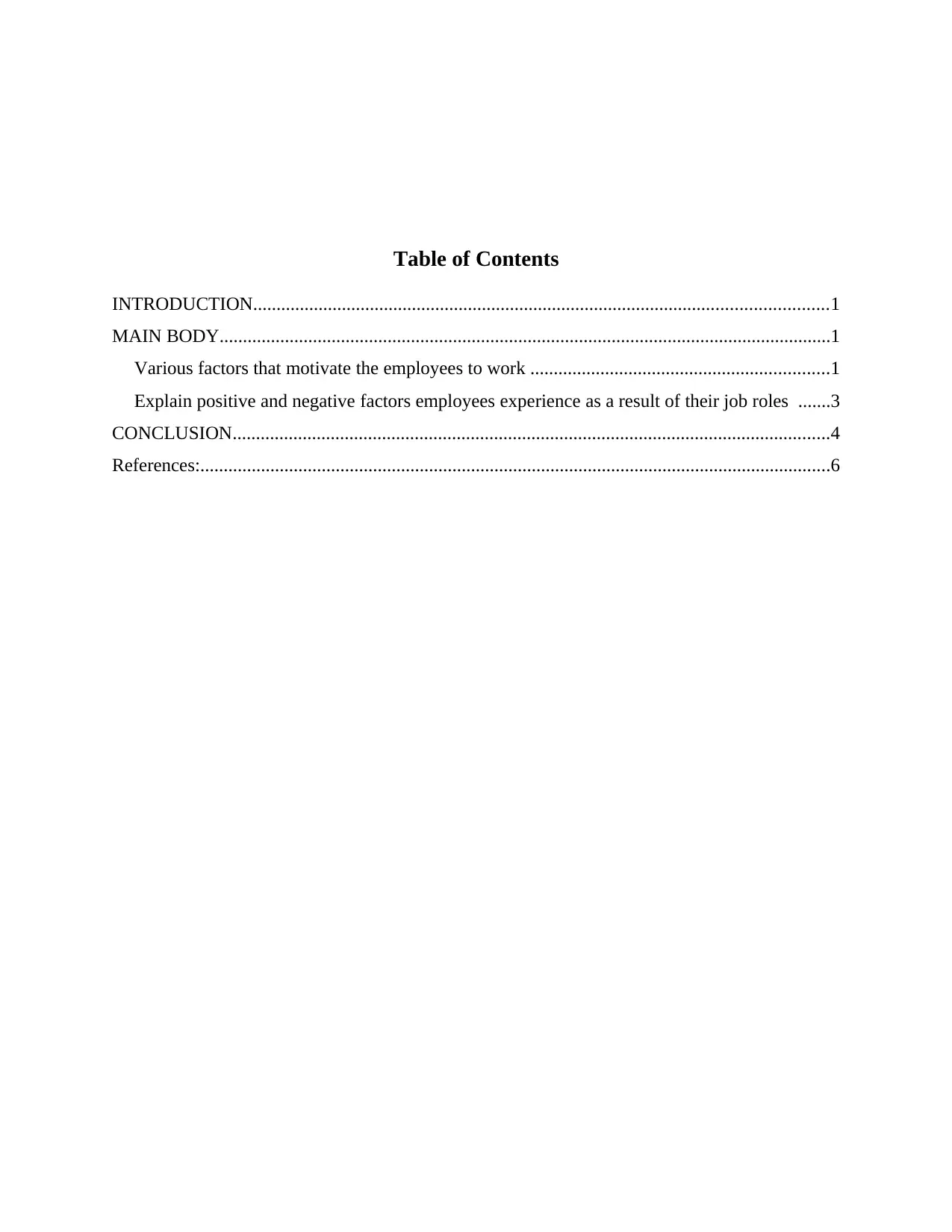
Table of Contents
INTRODUCTION...........................................................................................................................1
MAIN BODY...................................................................................................................................1
Various factors that motivate the employees to work ................................................................1
Explain positive and negative factors employees experience as a result of their job roles .......3
CONCLUSION................................................................................................................................4
References:.......................................................................................................................................6
INTRODUCTION...........................................................................................................................1
MAIN BODY...................................................................................................................................1
Various factors that motivate the employees to work ................................................................1
Explain positive and negative factors employees experience as a result of their job roles .......3
CONCLUSION................................................................................................................................4
References:.......................................................................................................................................6
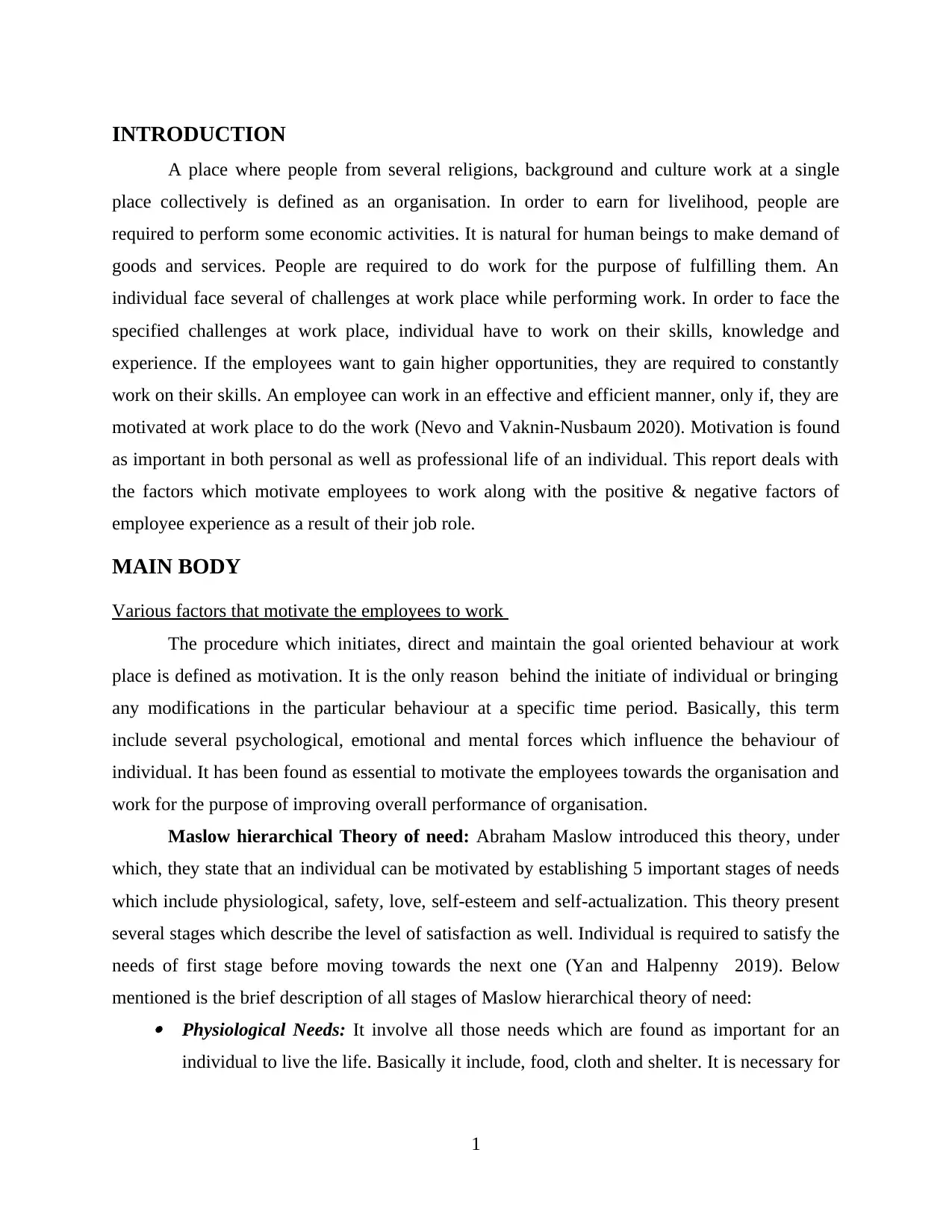
INTRODUCTION
A place where people from several religions, background and culture work at a single
place collectively is defined as an organisation. In order to earn for livelihood, people are
required to perform some economic activities. It is natural for human beings to make demand of
goods and services. People are required to do work for the purpose of fulfilling them. An
individual face several of challenges at work place while performing work. In order to face the
specified challenges at work place, individual have to work on their skills, knowledge and
experience. If the employees want to gain higher opportunities, they are required to constantly
work on their skills. An employee can work in an effective and efficient manner, only if, they are
motivated at work place to do the work (Nevo and Vaknin-Nusbaum 2020). Motivation is found
as important in both personal as well as professional life of an individual. This report deals with
the factors which motivate employees to work along with the positive & negative factors of
employee experience as a result of their job role.
MAIN BODY
Various factors that motivate the employees to work
The procedure which initiates, direct and maintain the goal oriented behaviour at work
place is defined as motivation. It is the only reason behind the initiate of individual or bringing
any modifications in the particular behaviour at a specific time period. Basically, this term
include several psychological, emotional and mental forces which influence the behaviour of
individual. It has been found as essential to motivate the employees towards the organisation and
work for the purpose of improving overall performance of organisation.
Maslow hierarchical Theory of need: Abraham Maslow introduced this theory, under
which, they state that an individual can be motivated by establishing 5 important stages of needs
which include physiological, safety, love, self-esteem and self-actualization. This theory present
several stages which describe the level of satisfaction as well. Individual is required to satisfy the
needs of first stage before moving towards the next one (Yan and Halpenny 2019). Below
mentioned is the brief description of all stages of Maslow hierarchical theory of need: Physiological Needs: It involve all those needs which are found as important for an
individual to live the life. Basically it include, food, cloth and shelter. It is necessary for
1
A place where people from several religions, background and culture work at a single
place collectively is defined as an organisation. In order to earn for livelihood, people are
required to perform some economic activities. It is natural for human beings to make demand of
goods and services. People are required to do work for the purpose of fulfilling them. An
individual face several of challenges at work place while performing work. In order to face the
specified challenges at work place, individual have to work on their skills, knowledge and
experience. If the employees want to gain higher opportunities, they are required to constantly
work on their skills. An employee can work in an effective and efficient manner, only if, they are
motivated at work place to do the work (Nevo and Vaknin-Nusbaum 2020). Motivation is found
as important in both personal as well as professional life of an individual. This report deals with
the factors which motivate employees to work along with the positive & negative factors of
employee experience as a result of their job role.
MAIN BODY
Various factors that motivate the employees to work
The procedure which initiates, direct and maintain the goal oriented behaviour at work
place is defined as motivation. It is the only reason behind the initiate of individual or bringing
any modifications in the particular behaviour at a specific time period. Basically, this term
include several psychological, emotional and mental forces which influence the behaviour of
individual. It has been found as essential to motivate the employees towards the organisation and
work for the purpose of improving overall performance of organisation.
Maslow hierarchical Theory of need: Abraham Maslow introduced this theory, under
which, they state that an individual can be motivated by establishing 5 important stages of needs
which include physiological, safety, love, self-esteem and self-actualization. This theory present
several stages which describe the level of satisfaction as well. Individual is required to satisfy the
needs of first stage before moving towards the next one (Yan and Halpenny 2019). Below
mentioned is the brief description of all stages of Maslow hierarchical theory of need: Physiological Needs: It involve all those needs which are found as important for an
individual to live the life. Basically it include, food, cloth and shelter. It is necessary for
1
⊘ This is a preview!⊘
Do you want full access?
Subscribe today to unlock all pages.

Trusted by 1+ million students worldwide
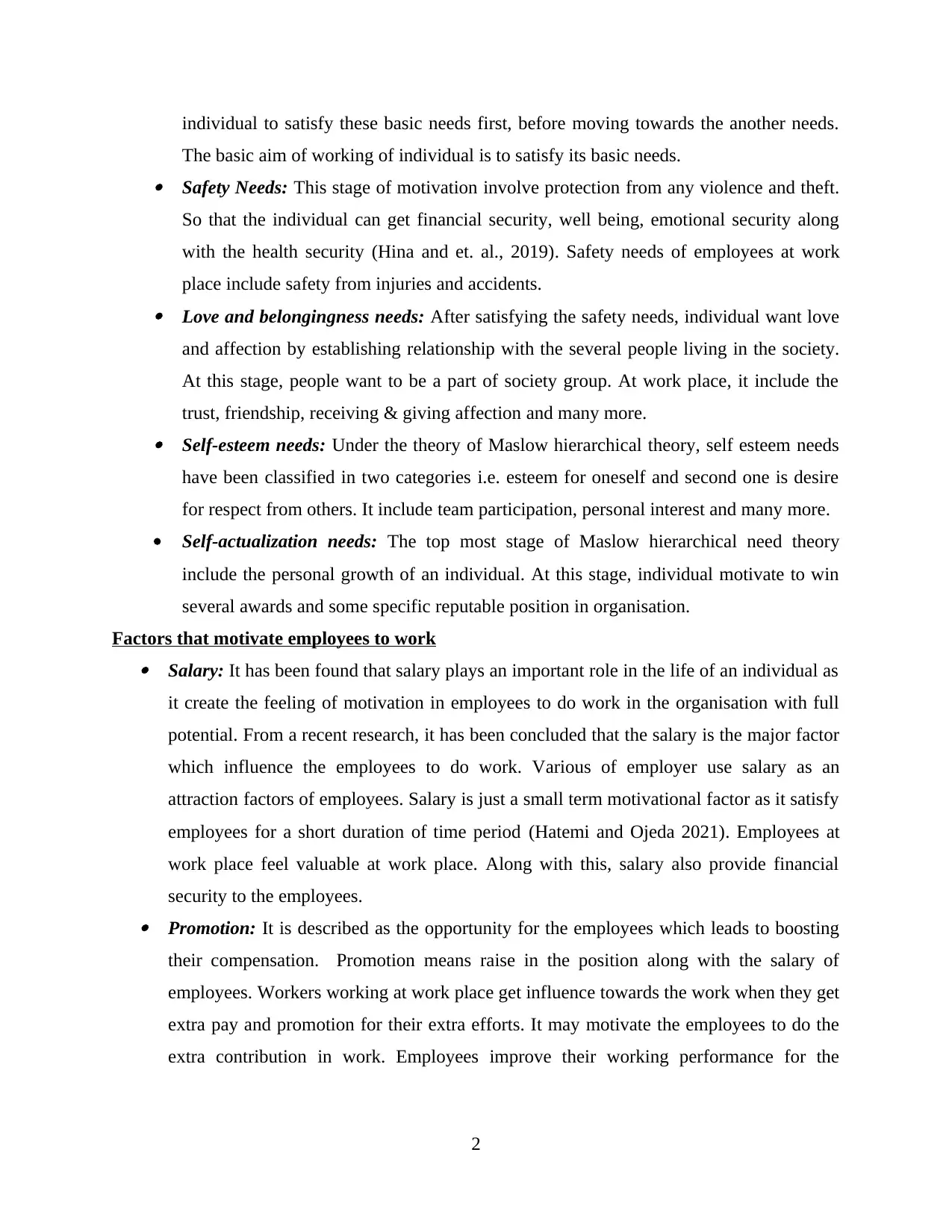
individual to satisfy these basic needs first, before moving towards the another needs.
The basic aim of working of individual is to satisfy its basic needs. Safety Needs: This stage of motivation involve protection from any violence and theft.
So that the individual can get financial security, well being, emotional security along
with the health security (Hina and et. al., 2019). Safety needs of employees at work
place include safety from injuries and accidents. Love and belongingness needs: After satisfying the safety needs, individual want love
and affection by establishing relationship with the several people living in the society.
At this stage, people want to be a part of society group. At work place, it include the
trust, friendship, receiving & giving affection and many more. Self-esteem needs: Under the theory of Maslow hierarchical theory, self esteem needs
have been classified in two categories i.e. esteem for oneself and second one is desire
for respect from others. It include team participation, personal interest and many more.
Self-actualization needs: The top most stage of Maslow hierarchical need theory
include the personal growth of an individual. At this stage, individual motivate to win
several awards and some specific reputable position in organisation.
Factors that motivate employees to work Salary: It has been found that salary plays an important role in the life of an individual as
it create the feeling of motivation in employees to do work in the organisation with full
potential. From a recent research, it has been concluded that the salary is the major factor
which influence the employees to do work. Various of employer use salary as an
attraction factors of employees. Salary is just a small term motivational factor as it satisfy
employees for a short duration of time period (Hatemi and Ojeda 2021). Employees at
work place feel valuable at work place. Along with this, salary also provide financial
security to the employees. Promotion: It is described as the opportunity for the employees which leads to boosting
their compensation. Promotion means raise in the position along with the salary of
employees. Workers working at work place get influence towards the work when they get
extra pay and promotion for their extra efforts. It may motivate the employees to do the
extra contribution in work. Employees improve their working performance for the
2
The basic aim of working of individual is to satisfy its basic needs. Safety Needs: This stage of motivation involve protection from any violence and theft.
So that the individual can get financial security, well being, emotional security along
with the health security (Hina and et. al., 2019). Safety needs of employees at work
place include safety from injuries and accidents. Love and belongingness needs: After satisfying the safety needs, individual want love
and affection by establishing relationship with the several people living in the society.
At this stage, people want to be a part of society group. At work place, it include the
trust, friendship, receiving & giving affection and many more. Self-esteem needs: Under the theory of Maslow hierarchical theory, self esteem needs
have been classified in two categories i.e. esteem for oneself and second one is desire
for respect from others. It include team participation, personal interest and many more.
Self-actualization needs: The top most stage of Maslow hierarchical need theory
include the personal growth of an individual. At this stage, individual motivate to win
several awards and some specific reputable position in organisation.
Factors that motivate employees to work Salary: It has been found that salary plays an important role in the life of an individual as
it create the feeling of motivation in employees to do work in the organisation with full
potential. From a recent research, it has been concluded that the salary is the major factor
which influence the employees to do work. Various of employer use salary as an
attraction factors of employees. Salary is just a small term motivational factor as it satisfy
employees for a short duration of time period (Hatemi and Ojeda 2021). Employees at
work place feel valuable at work place. Along with this, salary also provide financial
security to the employees. Promotion: It is described as the opportunity for the employees which leads to boosting
their compensation. Promotion means raise in the position along with the salary of
employees. Workers working at work place get influence towards the work when they get
extra pay and promotion for their extra efforts. It may motivate the employees to do the
extra contribution in work. Employees improve their working performance for the
2
Paraphrase This Document
Need a fresh take? Get an instant paraphrase of this document with our AI Paraphraser
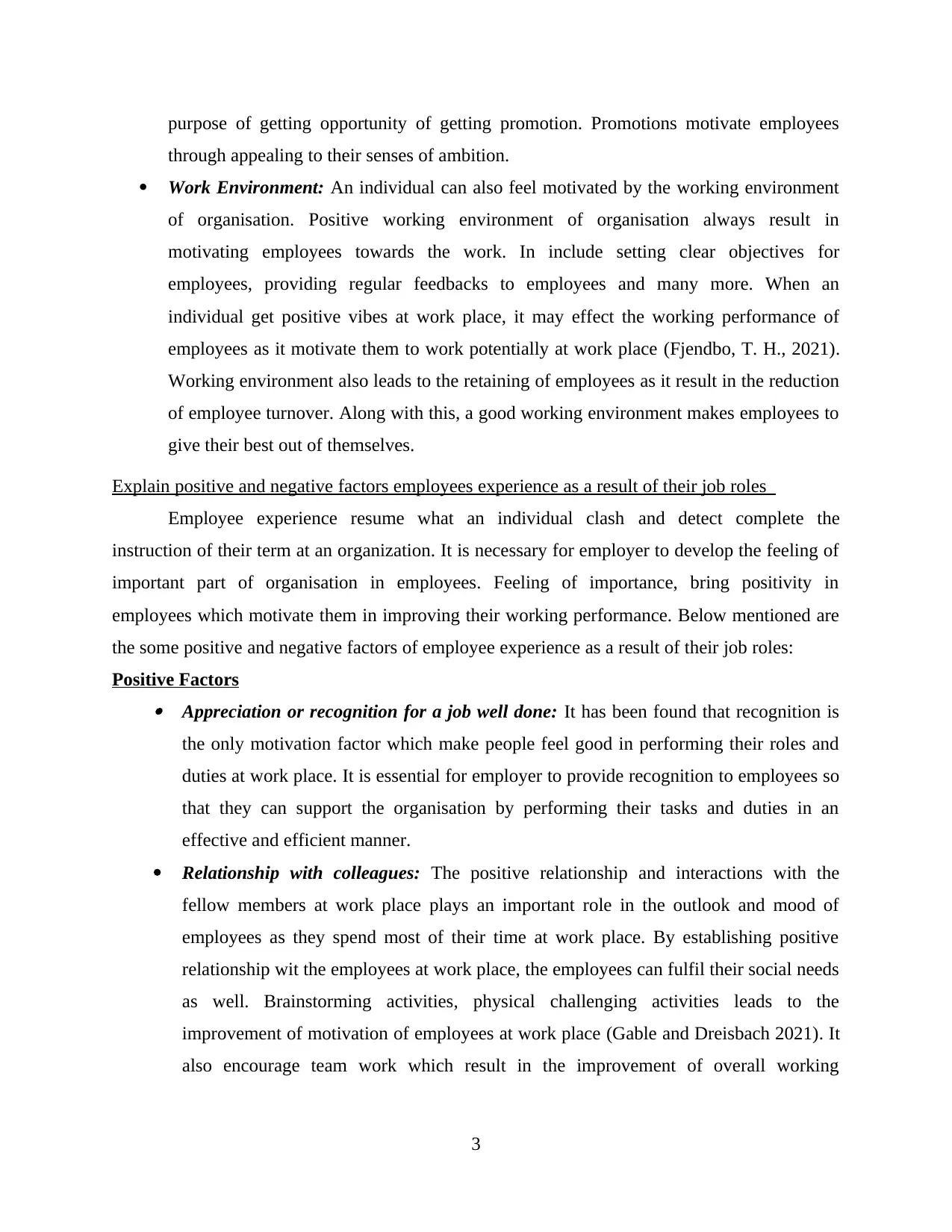
purpose of getting opportunity of getting promotion. Promotions motivate employees
through appealing to their senses of ambition.
Work Environment: An individual can also feel motivated by the working environment
of organisation. Positive working environment of organisation always result in
motivating employees towards the work. In include setting clear objectives for
employees, providing regular feedbacks to employees and many more. When an
individual get positive vibes at work place, it may effect the working performance of
employees as it motivate them to work potentially at work place (Fjendbo, T. H., 2021).
Working environment also leads to the retaining of employees as it result in the reduction
of employee turnover. Along with this, a good working environment makes employees to
give their best out of themselves.
Explain positive and negative factors employees experience as a result of their job roles
Employee experience resume what an individual clash and detect complete the
instruction of their term at an organization. It is necessary for employer to develop the feeling of
important part of organisation in employees. Feeling of importance, bring positivity in
employees which motivate them in improving their working performance. Below mentioned are
the some positive and negative factors of employee experience as a result of their job roles:
Positive Factors Appreciation or recognition for a job well done: It has been found that recognition is
the only motivation factor which make people feel good in performing their roles and
duties at work place. It is essential for employer to provide recognition to employees so
that they can support the organisation by performing their tasks and duties in an
effective and efficient manner.
Relationship with colleagues: The positive relationship and interactions with the
fellow members at work place plays an important role in the outlook and mood of
employees as they spend most of their time at work place. By establishing positive
relationship wit the employees at work place, the employees can fulfil their social needs
as well. Brainstorming activities, physical challenging activities leads to the
improvement of motivation of employees at work place (Gable and Dreisbach 2021). It
also encourage team work which result in the improvement of overall working
3
through appealing to their senses of ambition.
Work Environment: An individual can also feel motivated by the working environment
of organisation. Positive working environment of organisation always result in
motivating employees towards the work. In include setting clear objectives for
employees, providing regular feedbacks to employees and many more. When an
individual get positive vibes at work place, it may effect the working performance of
employees as it motivate them to work potentially at work place (Fjendbo, T. H., 2021).
Working environment also leads to the retaining of employees as it result in the reduction
of employee turnover. Along with this, a good working environment makes employees to
give their best out of themselves.
Explain positive and negative factors employees experience as a result of their job roles
Employee experience resume what an individual clash and detect complete the
instruction of their term at an organization. It is necessary for employer to develop the feeling of
important part of organisation in employees. Feeling of importance, bring positivity in
employees which motivate them in improving their working performance. Below mentioned are
the some positive and negative factors of employee experience as a result of their job roles:
Positive Factors Appreciation or recognition for a job well done: It has been found that recognition is
the only motivation factor which make people feel good in performing their roles and
duties at work place. It is essential for employer to provide recognition to employees so
that they can support the organisation by performing their tasks and duties in an
effective and efficient manner.
Relationship with colleagues: The positive relationship and interactions with the
fellow members at work place plays an important role in the outlook and mood of
employees as they spend most of their time at work place. By establishing positive
relationship wit the employees at work place, the employees can fulfil their social needs
as well. Brainstorming activities, physical challenging activities leads to the
improvement of motivation of employees at work place (Gable and Dreisbach 2021). It
also encourage team work which result in the improvement of overall working
3
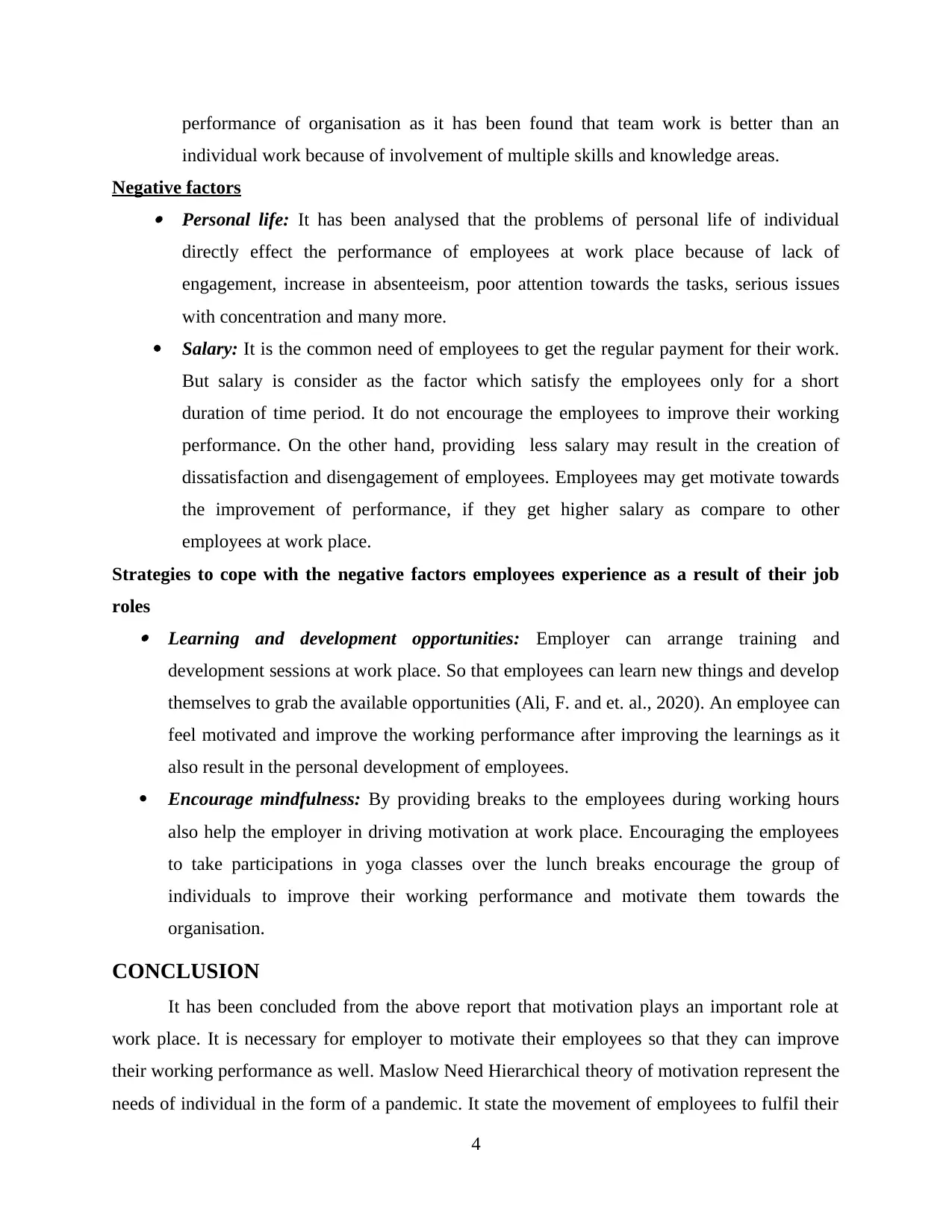
performance of organisation as it has been found that team work is better than an
individual work because of involvement of multiple skills and knowledge areas.
Negative factors Personal life: It has been analysed that the problems of personal life of individual
directly effect the performance of employees at work place because of lack of
engagement, increase in absenteeism, poor attention towards the tasks, serious issues
with concentration and many more.
Salary: It is the common need of employees to get the regular payment for their work.
But salary is consider as the factor which satisfy the employees only for a short
duration of time period. It do not encourage the employees to improve their working
performance. On the other hand, providing less salary may result in the creation of
dissatisfaction and disengagement of employees. Employees may get motivate towards
the improvement of performance, if they get higher salary as compare to other
employees at work place.
Strategies to cope with the negative factors employees experience as a result of their job
roles Learning and development opportunities: Employer can arrange training and
development sessions at work place. So that employees can learn new things and develop
themselves to grab the available opportunities (Ali, F. and et. al., 2020). An employee can
feel motivated and improve the working performance after improving the learnings as it
also result in the personal development of employees.
Encourage mindfulness: By providing breaks to the employees during working hours
also help the employer in driving motivation at work place. Encouraging the employees
to take participations in yoga classes over the lunch breaks encourage the group of
individuals to improve their working performance and motivate them towards the
organisation.
CONCLUSION
It has been concluded from the above report that motivation plays an important role at
work place. It is necessary for employer to motivate their employees so that they can improve
their working performance as well. Maslow Need Hierarchical theory of motivation represent the
needs of individual in the form of a pandemic. It state the movement of employees to fulfil their
4
individual work because of involvement of multiple skills and knowledge areas.
Negative factors Personal life: It has been analysed that the problems of personal life of individual
directly effect the performance of employees at work place because of lack of
engagement, increase in absenteeism, poor attention towards the tasks, serious issues
with concentration and many more.
Salary: It is the common need of employees to get the regular payment for their work.
But salary is consider as the factor which satisfy the employees only for a short
duration of time period. It do not encourage the employees to improve their working
performance. On the other hand, providing less salary may result in the creation of
dissatisfaction and disengagement of employees. Employees may get motivate towards
the improvement of performance, if they get higher salary as compare to other
employees at work place.
Strategies to cope with the negative factors employees experience as a result of their job
roles Learning and development opportunities: Employer can arrange training and
development sessions at work place. So that employees can learn new things and develop
themselves to grab the available opportunities (Ali, F. and et. al., 2020). An employee can
feel motivated and improve the working performance after improving the learnings as it
also result in the personal development of employees.
Encourage mindfulness: By providing breaks to the employees during working hours
also help the employer in driving motivation at work place. Encouraging the employees
to take participations in yoga classes over the lunch breaks encourage the group of
individuals to improve their working performance and motivate them towards the
organisation.
CONCLUSION
It has been concluded from the above report that motivation plays an important role at
work place. It is necessary for employer to motivate their employees so that they can improve
their working performance as well. Maslow Need Hierarchical theory of motivation represent the
needs of individual in the form of a pandemic. It state the movement of employees to fulfil their
4
⊘ This is a preview!⊘
Do you want full access?
Subscribe today to unlock all pages.

Trusted by 1+ million students worldwide

needs. On the basis of their needs, an individual can be motivated. Motivation have both positive
as well as negative influence on the performance of employees. It is necessary for employer to
develop relevant strategies for the purpose of avoiding negative impact of motivation.
5
as well as negative influence on the performance of employees. It is necessary for employer to
develop relevant strategies for the purpose of avoiding negative impact of motivation.
5
Paraphrase This Document
Need a fresh take? Get an instant paraphrase of this document with our AI Paraphraser
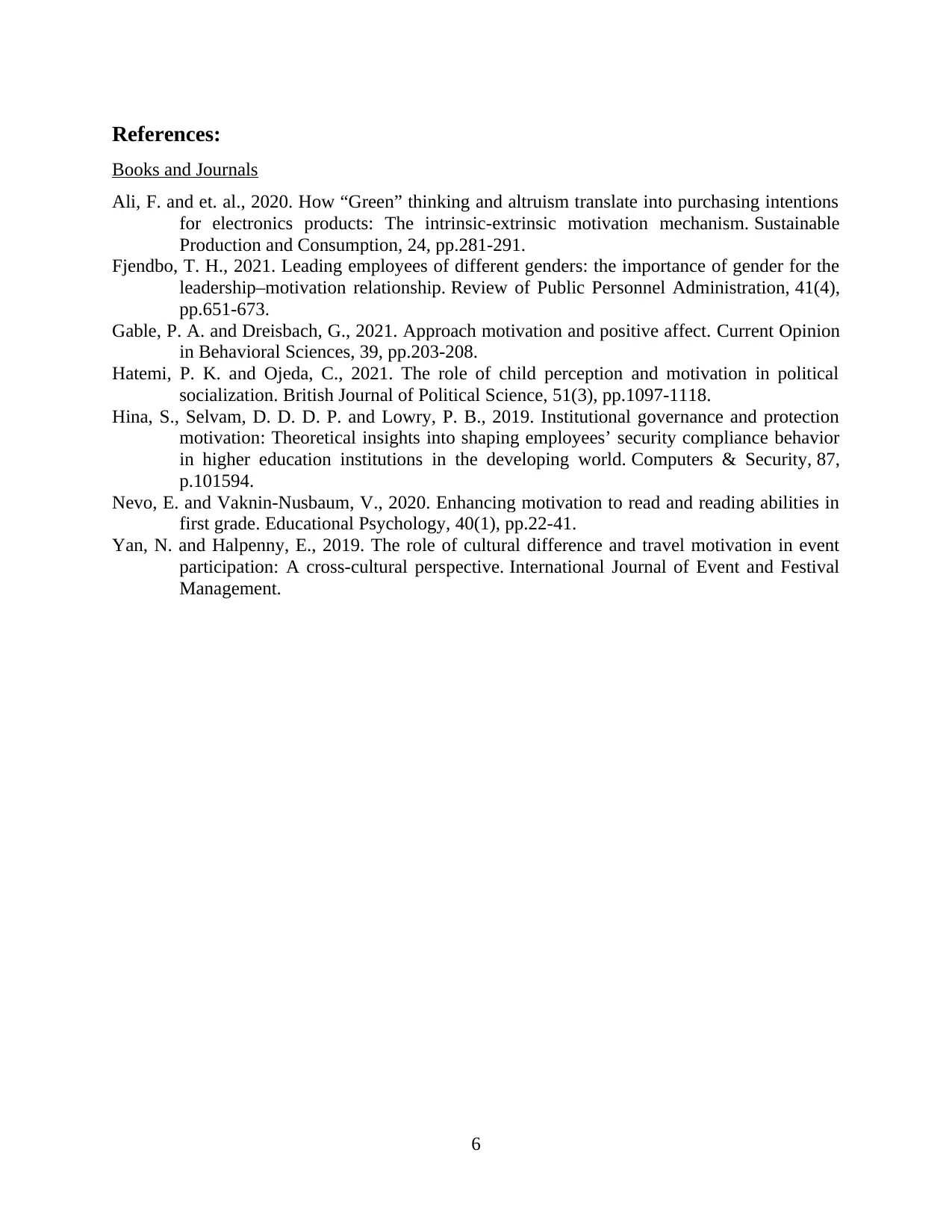
References:
Books and Journals
Ali, F. and et. al., 2020. How “Green” thinking and altruism translate into purchasing intentions
for electronics products: The intrinsic-extrinsic motivation mechanism. Sustainable
Production and Consumption, 24, pp.281-291.
Fjendbo, T. H., 2021. Leading employees of different genders: the importance of gender for the
leadership‒motivation relationship. Review of Public Personnel Administration, 41(4),
pp.651-673.
Gable, P. A. and Dreisbach, G., 2021. Approach motivation and positive affect. Current Opinion
in Behavioral Sciences, 39, pp.203-208.
Hatemi, P. K. and Ojeda, C., 2021. The role of child perception and motivation in political
socialization. British Journal of Political Science, 51(3), pp.1097-1118.
Hina, S., Selvam, D. D. D. P. and Lowry, P. B., 2019. Institutional governance and protection
motivation: Theoretical insights into shaping employees’ security compliance behavior
in higher education institutions in the developing world. Computers & Security, 87,
p.101594.
Nevo, E. and Vaknin-Nusbaum, V., 2020. Enhancing motivation to read and reading abilities in
first grade. Educational Psychology, 40(1), pp.22-41.
Yan, N. and Halpenny, E., 2019. The role of cultural difference and travel motivation in event
participation: A cross-cultural perspective. International Journal of Event and Festival
Management.
6
Books and Journals
Ali, F. and et. al., 2020. How “Green” thinking and altruism translate into purchasing intentions
for electronics products: The intrinsic-extrinsic motivation mechanism. Sustainable
Production and Consumption, 24, pp.281-291.
Fjendbo, T. H., 2021. Leading employees of different genders: the importance of gender for the
leadership‒motivation relationship. Review of Public Personnel Administration, 41(4),
pp.651-673.
Gable, P. A. and Dreisbach, G., 2021. Approach motivation and positive affect. Current Opinion
in Behavioral Sciences, 39, pp.203-208.
Hatemi, P. K. and Ojeda, C., 2021. The role of child perception and motivation in political
socialization. British Journal of Political Science, 51(3), pp.1097-1118.
Hina, S., Selvam, D. D. D. P. and Lowry, P. B., 2019. Institutional governance and protection
motivation: Theoretical insights into shaping employees’ security compliance behavior
in higher education institutions in the developing world. Computers & Security, 87,
p.101594.
Nevo, E. and Vaknin-Nusbaum, V., 2020. Enhancing motivation to read and reading abilities in
first grade. Educational Psychology, 40(1), pp.22-41.
Yan, N. and Halpenny, E., 2019. The role of cultural difference and travel motivation in event
participation: A cross-cultural perspective. International Journal of Event and Festival
Management.
6
1 out of 8
Related Documents
Your All-in-One AI-Powered Toolkit for Academic Success.
+13062052269
info@desklib.com
Available 24*7 on WhatsApp / Email
![[object Object]](/_next/static/media/star-bottom.7253800d.svg)
Unlock your academic potential
Copyright © 2020–2026 A2Z Services. All Rights Reserved. Developed and managed by ZUCOL.




